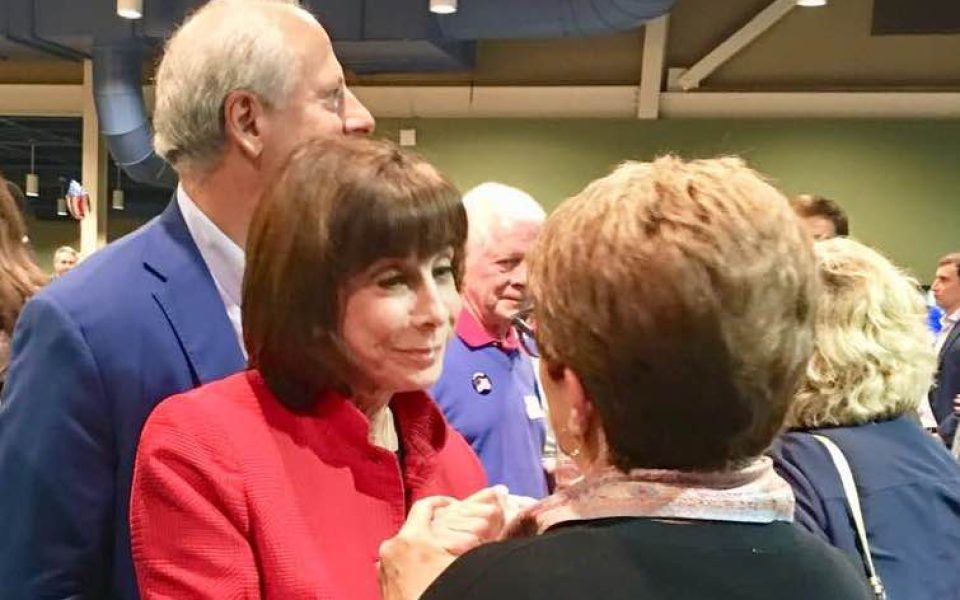The floodwall erected by Republican gerrymandering proved capable of withstanding the blue wave in North Carolina’s congressional races, with Democrat Kathy Manning falling short in the 13th District.
Despite robust fundraising, vigorous campaigning and assists from national groups ranging from the Democratic House caucus to California billionaire Tom Steyers, Manning ended the night about 5 points behind Republican incumbent Ted Budd, who will serve his second term. Manning halved the previous gap from two years ago, while fellow Democrat Linda Coleman narrowed the margin with Republican incumbent George Holding to 5.4 points, from 13.4 points in 2016 in the 2nd District near Raleigh. But Democrats struck closest to gold in the 9th District outside of Charlotte, where Democrat Dan McCready, an entrepreneur and Marine veteran, trailed Republican Mark Harris, an evangelical pastor, by 1,860 votes, or 0.66 percent, in unofficial final results.
Despite falling short in at least two out of three of the congressional races in play, North Carolina wasn’t needed to allow Democrats to flip the 23 seats needed to re-take the US House. Manning was the marquee figure at a Democrat gathering at a banquet hall at the Greensboro Coliseum Complex on Tuesday night, and despite her apparent loss the crowd was still energized.
“There are a lot of votes left to be counted, and we always knew this would be a tough race, and no matter what tomorrow brings we should not be discouraged,” Manning said. “This is the beginning, not the end of our effort to correct the path this country has taken.”
Democrats were already looking towards 2020 as the results came in on Tuesday. Ashton Clemmons, an assistant school superintendent who prevailed in a Guilford County state House race that turned blue thanks to new district lines, said she and other Democrats decided to run because they saw a need for justice, compassion and tolerance.
“The forces that we’re fighting against still exist tomorrow, no matter what happens in this election,” Clemmons said. “We still have work to do. So we all get to take a little bit of a break because we’re tired. But the work continues. We need to start looking at 2020, and continue to fight for who we know we should be as a country.”
The two congressional races — the 13th in the Triad and the 9th in the Charlotte area — drew President Trump into the fray. Trump visited Charlotte twice to campaign on behalf of Budd and Harris during his barnstorming tour to promote Republican House and Senate candidates.
“My opponent is not for making America great again,” Budd said, standing by the president’s side at Ovens Arena on Oct. 26. “She’s against the tax cuts. And — this is important — she’s given big money to [Democrat Minority Leader Nancy] Pelosi and all her friends. So, Mr. President, I’m going to stand with you on cutting taxes, on building the wall and draining the swamp.”
While Trump’s scorched-earth rhetoric on the campaign trail raised fears about a so-called migrant “invasion” and Democratic “mobs,” his offensive against Manning was relatively mild, coming after a week of bombing threats against prominent Democrats, CNN and liberal figures.
“Kathy Manning pretends to be a moderate, but she will always do the bidding for Pelosi and the far-left donors who are backing her campaign,” Trump said. “She’s a lefty, and she’s always going to be voting on the left. And I know your state very well. We won it handily. And I will tell you: You don’t love the left too much, especially the far left. She wants to raise your taxes. And she is for massive giving of amnesty. So that’s the end of her.”
Despite donating to Pelosi’s campaign, Manning had pledged to vote against her for House speaker. And Manning campaigned as a moderate, pledging to “work across the aisle to get things done” and “put country over party and work for the people of North Carolina.” Contrary to Trump’s claim that Manning is in favor of “massive giving of amnesty,” the Democratic candidate said she supported “a pathway for the Dreamers, especially those who serve as first responders or in the military” after securing the border and increasing “penalties for companies that break the law.”
The 2018 election saw turnout among college students that looked more like a presidential election than a typical midterm. Turnout across the state reached 52.0 percent, compared to 44.4 percent in the last midterm election in 2014.
The blue wave made the most impact in local races in Guilford County, with Democrat Danny Rogers upsetting Republican BJ Barnes, ending a 24-year run that began with the 1994 Republican wave election. Rogers prevailed to become the first black sheriff of Guilford County, and won against a Republican incumbent who campaigned alongside Trump two years ago.
If Trump wanted to make the 2018 midterms about himself, many Democrats were happy to take him up on the offer. Adam Coker, a progressive Democrat who lost to Kathy Manning in the 13th District primary, was looking at the sheriff’s race as a good omen for 2020.
“If Danny Rogers wins against BJ Barnes, that is a Guilford County referendum on Donald Trump,” Coker said.
Join the First Amendment Society, a membership that goes directly to funding TCB‘s newsroom.
We believe that reporting can save the world.
The TCB First Amendment Society recognizes the vital role of a free, unfettered press with a bundling of local experiences designed to build community, and unique engagements with our newsroom that will help you understand, and shape, local journalism’s critical role in uplifting the people in our cities.
All revenue goes directly into the newsroom as reporters’ salaries and freelance commissions.


Leave a Reply